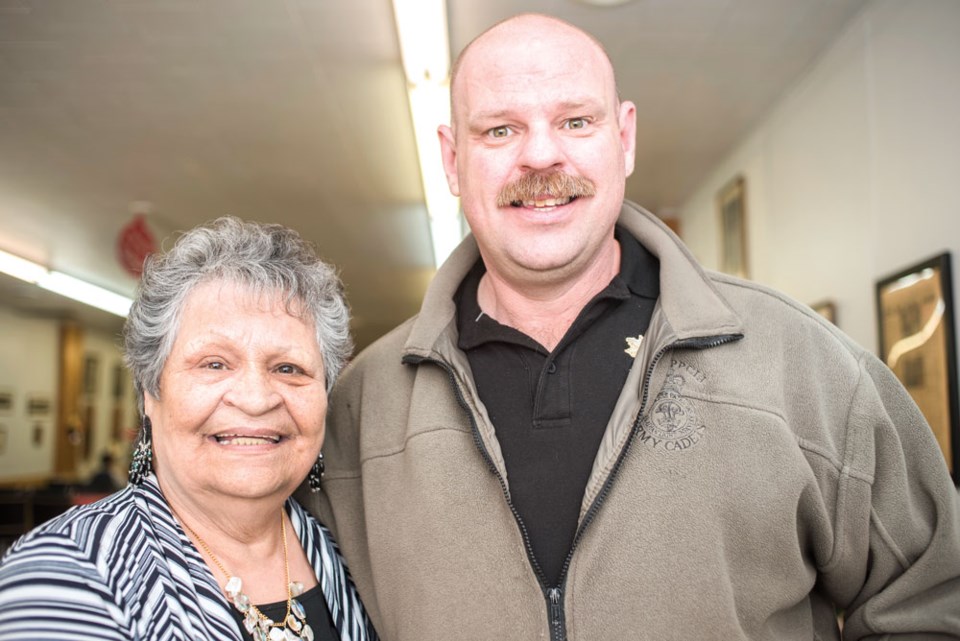Margaret Messer purchased a booth at the No. 2901 Estevan Army Cadets’ Craft Show on Dec. 2 at the Royal Canadian Legion’s Estevan branch, in order to sell some of her homemade items, such as moccasins.
The event was anticipated to be uneventful. 
Messer has a small home-based business called MMMC Creations that she runs with her friend Marylou Clauson. The two experienced relatively good sales at the craft show and are looking forward to many more.
She was not excepting to run into Craig Bird who, among many things, is a military historian with 10 years of military service and experience under his belt. Bird is also the commanding officer for the local army cadets.
For a very long time, Messer has been searching for information about her father, who fought in the First World War. His story, up until recently, has been forgotten for a very long time.
‚ÄúThe veterans don‚Äôt talk about that stuff and the rest of it just disappears into oblivion. Some families don‚Äôt even know that they had some family members in the military,‚ÄĚ said Bird.
‚ÄúWhen all that information falls into mystery, families don‚Äôt know how to access that information and some stories never get told.‚ÄĚ
Messer approached Bird for information during the craft show and it didn’t take long for him to deliver an answer.
‚ÄúI came up and asked about my father who was in the First World War and Craig said he could help me and he did,‚ÄĚ said Messer. ‚ÄúIt was the most wonderful Christmas present I ever got, was information about my father.‚ÄĚ
‚ÄúWhen he died we asked if there was anything left like personal records or anything like that and they said they didn‚Äôt know,‚ÄĚ she added.
Messer’s mother was a full blood Chipewyan originally from the Dene Nation. That side of her family is from the Yellowknife area and Messer herself is half Chipewyan.
Her father Alcide Baillargeon was originally from Quebec. He joined the army in 1915 and became apart of the 233rd Battalion with the Royal Engineers. His role was a sapper, meaning he would search and destroy mines, clear obsoletes and generally work around explosives.
In 1917 he was discharged as being unfit for general duty. Bird believes he had advanced post-traumatic stress disorder (PTSD). Baillargeon survived the war but he came back with mental trauma. 
‚ÄúLooking at the military records it looks like he was suffering from PTSD and he was discharged for being medically unfit for general service,‚ÄĚ said Bird.
‚ÄúMy farther was from Quebec and after the war he came towards Alberta and landed in Lac La Biche, Alberta and had a little farm or something and decided he wanted to get married,‚ÄĚ said Messer.
‚ÄúHe went up the Mackenzie River all the way into the North West Territories to Fort Resolution where they had a mission and he asked the priest there for a wife and they gave him my mother.‚ÄĚ
‚ÄúThat was the power of the church. She could not say no.‚ÄĚ
The story of Baillargeon’s life between the end of the war and his voluntary admission to a veterans’ home for long-term care is currently not known in great detail.
Messer was born in 1944 and her father shortly thereafter went into the home.
‚ÄúHe went into the veterans home when we were so little and he was in Edmonton at the veterans‚Äô home, and you couldn‚Äôt travel back there or whatever. My mother was just on a little pension from the military because she lost her treaty rights,‚ÄĚ said Messer.
‚ÄúEventually we had to go back to Yellowknife and my father was not a part of our lives,‚ÄĚ she added.
Between the residential school system that was in full swing in the early 20th century, the mind-crippling trauma her father experienced during the war and the removal of her mother’s treaty rights when she married her husband, it all equated to a father Messer only knew in name but not in person.
‚ÄúSince my mother married this white man, she lost her treaty rights so we were in the residential school as charity cases,‚ÄĚ said Messer.
A lot of Indigenous children have been through the residential school system and Messer was no exception.
‚ÄúI was in Fort Resolution in the North West Territories and I went into the residential school system there when I was four and I got out around 1960,‚ÄĚ said Messer.
‚ÄúMy husband came up there to work at Giant Mine and I was the only gem he found.‚ÄĚ
Messer ended up marrying into a big family in southern Saskatchewan and she has children and grandchildren. She is very happy attending craft and trade shows to sell her work.
‚ÄúMy great grandchildren will have a tie to their great grandfather now that Craig has found out all this information about him,‚ÄĚ said Messer.
It is amazing what unexpected things can happen in life like random chance encounters that end up answering decades of questions and unlocking the unknown story of a war veteran.




